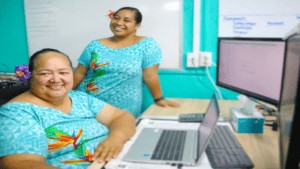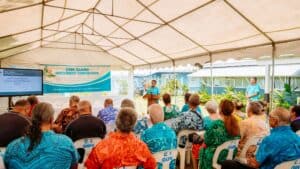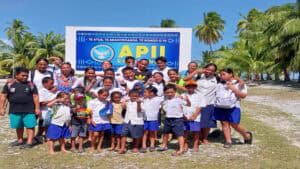Many small nations around the world – the Cook Islands included – can suffer from depopulation. They sometimes have a diaspora – the number of their citizens living abroad – which is greater, sometimes many times over, than those living at home.
That can happen for many reasons; lack of jobs or meaningful work, poor economic conditions, adverse weather events, conflict, warfare, desire for a better education and a better way of life.
It can happen inside countries too; for example in New Zealand my own Ngati Porou iwi, which is arguably the largest in the country, has only a fraction of its people living inside the tribal boundaries on the North Island’s east coast; with a hundred thousand or more, living elsewhere in Aotearoa, or Australia or the world; including the Cook Islands.
Coincidentally, Ngati Porou and the Cook Islands as a whole, probably have roughly the same size populations. In both cases too the diaspora – those living away from home – includes many skilled and highly educated people whose help and experience could be put to good use at home.
In Ngati Porou’s case that has led to attempts to encourage skilled governance practitioners and people like lawyers, accountanrts, farm supervisors, health workers to come home; or utilising their skills by appointing them to governance boards for the tribe’s farms, forestry and fishing companies, manuka honey operation and health services.
Similarly here, a highly qualified Cook Islander who lives in New Zealand, has just completed seven and a half years on the Board of the Cook Islands Investment Corporation(CIIC) – one of the government’s most powerful agencies.
Caren Jane Rangi has family ties to Rarotonga, Rakahanga and Aitutaki, but was born and raised in New Zealand.
Her parents were childhood sweethearts.
Caren’s mother – Berry – is from Rakahanga. She left there when she was 12 to attend Tereora College in Rarotonga ; she’s now 80 and has not been back to Rakahanga since she was a teenager. Caren’s father – Puna – was raised by his grandfather in Parekura, which is where the couple first met.
When they eventually decided to get married in Aotearoa, they bypassed the normal destination – Auckland – where Cook Islanders used to settle in Aotearoa back then, and headed to Christchurch, where they started married life on their own. Caren was born there in 1967, her brother Geoffrey followed two years later.
Eventually mother decided the cold was too much, and the family moved to the warmer climes of Napier, to the suburb of Tamatea, where they still live today.
Caren first came to the Cook Islands in 1978, when she was 11. She met her mother’s feeding father (her great-great grand uncle), who had traveled from Rakahanga to meet up with the family. That memory has fixed itself in her mind. She recalls they wanted to take him back to Napier with them, but he declined, and died very shortly after that.
Caren had her primary and secondary education in Tamatea. At one stage she wanted to join a Cook Islands dance group that was heading off to Barcelona; probably fortunately, her parents intervened.
Instead she was steered towards Massey University where she graduated with a Bachelor of Business Studies and Accountancy, and started on the path to a stellar career, particularly in business governance, in New Zealand.
Her current roles there include, Chair of the Arts Council of NZ, Board member of Radio New Zealand, and Te Papa – the Museum of NZ. In addition to those prestigious appointments, she either is or has been on the Board of nearly twenty other New Zealand public boards and organisations.
As well as demonstrating good governance and leading by example, Caren has done years of consultancy work with organisations like local government councils assisting them to set up good governance processes.
She has had public recognition too. In the 2018 Queen’s Birthday Honours, Caren was appointed an Officer of the New Zealand Order of Merit (ONZM), for services to the Pacific community and governance; and for the last seven and a half years, CIIC and the Cook Islands, has had access to that experience and expertise.
In her CV, Caren says her objective in life is to maintain a healthy balance between family, career and community.
A major turning point in her personal her life occured when she met her life partner and now husband – McKenzie Kaitao – at a social in Naenae, near Wellington.
McKenzie is Aitutaki born and bred. After leaving possibly the worlds most famous atoll, he headed to the bright lights of the Taylor Preston freezing works in Wellington . His folks meantime were in Porirua, and somehow, on that particular day, he wound up in Naenae at that social. The rest is history, they now have two children Mika 21, and Kaiata 15.
Her career seems to be going ok too, if the list of boards she’s on is anything to go by.
And while there are more Cook Islanders living in Auckland, Hawkes Bay has a very vibrant community too, as shown when all of the resident Pasifika people in ‘the Bay’ recently rallied round to help each other to recover from Cyclone Gabrielle. And frankly, how good is it to be still living just around the corner from your parents; in fact the whole family – brother Geoffrey too – live in Napier.
Michael Henry, the Chair of CIIC reflected on Caren’s 7 and half years’ service to CIIC, said “on behalf of the CIIC Board, and the many Directors across the Group, I would like to thank Caren for her significant contribution to the governance of CIIC and our various statutory Boards over the last 7 years.
“Caren has delivered significant value by imparting corporate governance, best practice and embedding various initiatives, including the facilitation of many Director Training sessions, and improving strategy and risk management practices. All these initiatives will have a profound difference for us and the nation into the future.
“There is no doubt the nation will continue to benefit from the legacy Caren has left with us and Caren’s expertise in the future. Aere ra Caren, Meitaki Atupaka, kia Orana e kia Manuia.”



